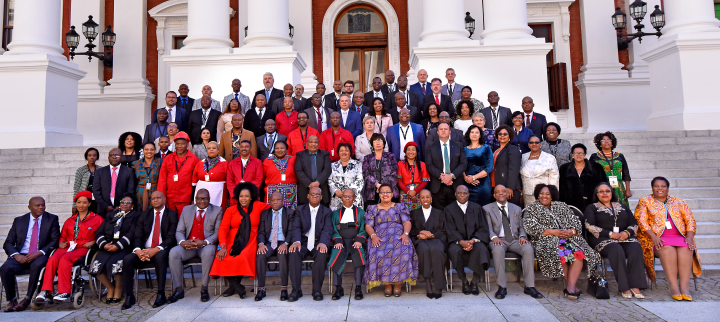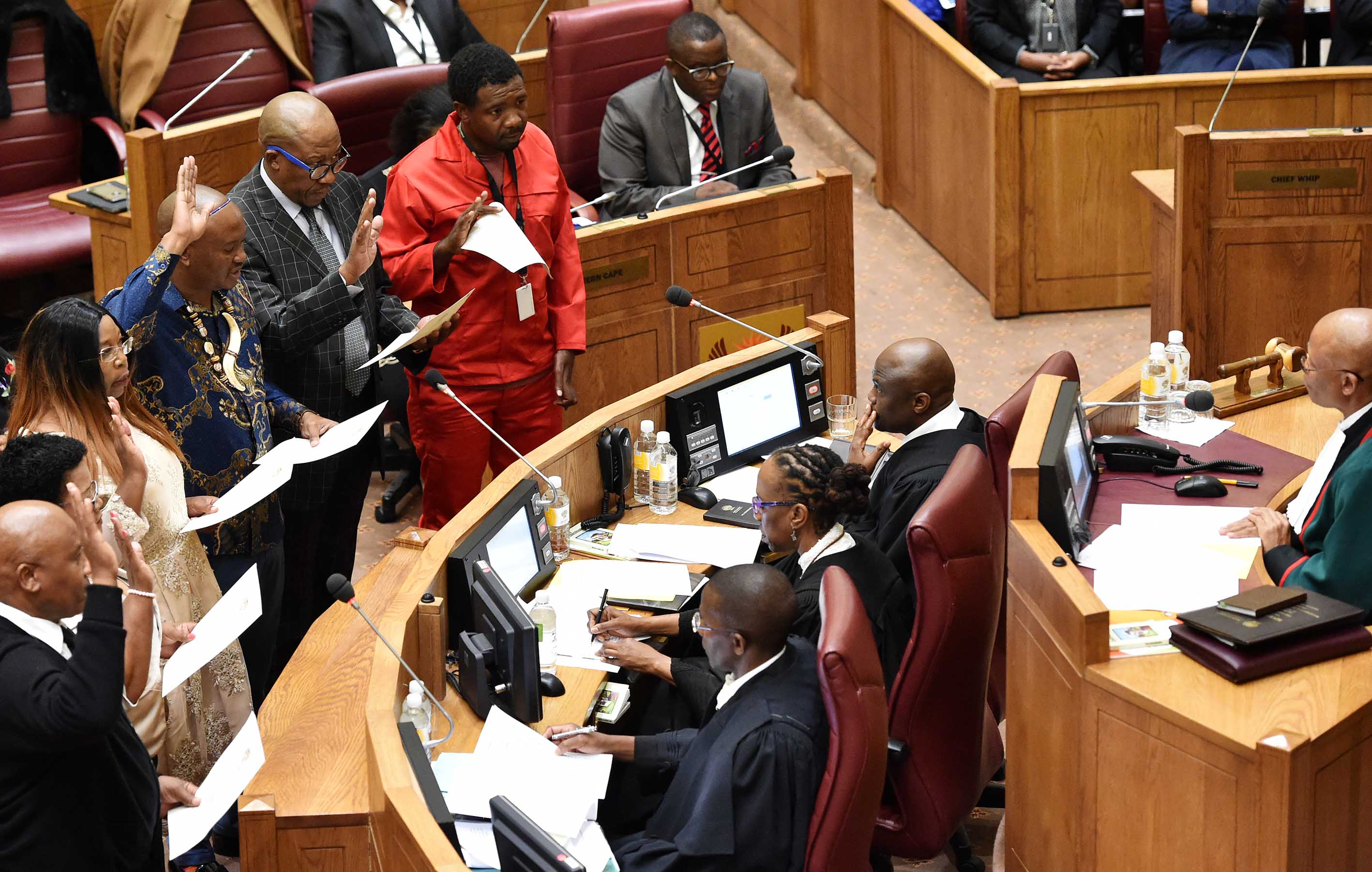PARLIAMENTARY NOTEBOOK
With both Houses of Parliament in place, it’s all eyes on the inauguration and Cabinet announcement

Thursday’s swearing-in of the 54 permanent delegates of the National Council of Provinces was a staid affair, but then the house that must champion the nine provinces is often seen as the stepchild of Parliament. Now both Houses are constituted, the parliamentary calendar should kick into high gear. Sort of.
Day two of swearing in South Africa’s 454 parliamentarians found Chief Justice Mogoeng Mogoeng in the hot seat in the National Council of Provinces (NCOP), overseeing a much shorter process than in the National Assembly on Wednesday, 22 May 2019. Then it was 400 MPs; on Thursday there were 54 permanent delegates taking the oath of office to be faithful to the Constitution and country.
Mogoeng cautioned those newly sworn-in lawmakers as the signing of their oath of office forms apparently didn’t quite go smoothly in the National Assembly:
“Some signed both — the space where they are supposed to sign and where I am supposed to sign. Please be careful!”

Swearing in of new members of the National Council Of Provinces in the NCOP House presided over by Chief Justice Mogoeng Mogoeng. Cape Town. 23/05/2019. Jairus Mmutle/GCIS
Amos Masondo, the ANC’s choice as NCOP chair, was elected unopposed, unlike National Assembly Speaker Thandi Modise, against whom the DA fielded their own, ultimately unsuccessful candidate. Masondo took over and his deputy Sylvia Lucas, the ex-Northern Cape premier, was also elected unopposed. As was NCOP Chief Whip Seiso Mohai.
“ANC, ANC, ANC, ANC…” erupted in the NCOP in a replay of the Zuma administration years — and in stark contrast to the co-operative tone emphasising MPs’ common mandate. The NCOP may just become the place to track the ANC’s factional swings and sways at the provincial level.
But that would be in the coming months. As the parliamentary agenda is melded to the governing ANC’s programme to constitute a new state, right now the focus shifts to Tshwane and the Union Buildings for Saturday’s inauguration of President Cyril Ramaphosa and the subsequent announcement of Cabinet expected from Sunday, or perhaps Monday.
The choreography is delicate; the optics managed.
And while ANC Chief Whip Pemmy Majodina said after the governing party’s Tuesday’s special parliamentary caucus that chairpersons of committees would be announced after the ministers became known, it seems there’ll be a bit of a wait yet. The parliamentary calendar at this stage has set aside the morning of 5 June for that election.
Effectively, this means these committee chairpersons’ elections follow the ANC National Executive Committee (NEC) lekgotla from 31 May to 3 June. While the draft programme Daily Maverick has seen does not include an agenda item of parliamentary committee chairpersons, it includes ANC NEC member Nkosazana Dlamini Zuma’s presentation on a 25-Year Review and a panel discussion on development, state and a social compact — and the interventions needed for the next five years.
It would be unusual for such deployments not to be discussed, particularly as the strategic House Chairperson of Committee Chairpersons, known as “chair of chairs”, is vacant after outgoing minister Nomvula Mokonyane, at the last minute on Wednesday, declined her deployment.
Given the numerical dominance of the ANC, the governing party gets to chair the committees — all but the public spending watchdog, the Standing Committee of Public Accounts (Scopa), which traditionally is chaired by an opposition MP. However, in line with ANC hierarchies, those names are determined at best with the guidance and recommendations of the chief whip and parliamentary political leaders, but at worst in the Office of the Secretary-General at Luthuli House ANC head office.
How it will pan out this time around remains to be seen. Crucially, aside from considering another “chair of chairs”, the ANC would have to pay some thought to who from the opposition parties should chair Scopa, as African People’s Convention (APC) MP Temba Godi lost his seat in Parliament.
Although Majodina met her chief whip counterparts from other political parties immediately after Wednesday’s National Assembly proceedings, including Ramaphosa’s election as president, it will only be in early June the first chief whips’ forum would meet. The multi-party structure is meant to smooth out the crinkles behind the scenes for Parliament to function efficiently.
And the committee that sets the programme of Parliament is expected to meet only in mid-June. It’ll be then that further details would emerge on the about 40 Budget votes that must be passed to give full effect to February’s financial allocations. Traditionally the Budget is passed in June, but in 2019 the statutory four-month period is hooked on the start of the financial year of 1 April, under the Money Bills Amendment Procedures and Related Matters Act.
It’s a high-pressure time in any given year — some days there are nine budget votes — but this time around there are additional dynamics. On the MPs benches, many would have had had a few weeks only to get to grips with their new responsibilities. And new ministers could be in charge of the portfolios, which may be in transition as a leaner government structure with fewer departments is anticipated.
The Budget vote debates are expected to take their cue from Ramaphosa’s State of the Nation Address on 20 June. That address would be the third in a month where the president could outline the tone of his administration, starting with Ramaphosa’s address shortly after being elected as president by the National Assembly when he pledged to be president for all South Africans and the inauguration.
But it’s in the State of the Nation Address that the details of government programmes and projects will emerge alongside the tone and character of the administration Ramaphosa would like to see. DM

















 Become an Insider
Become an Insider